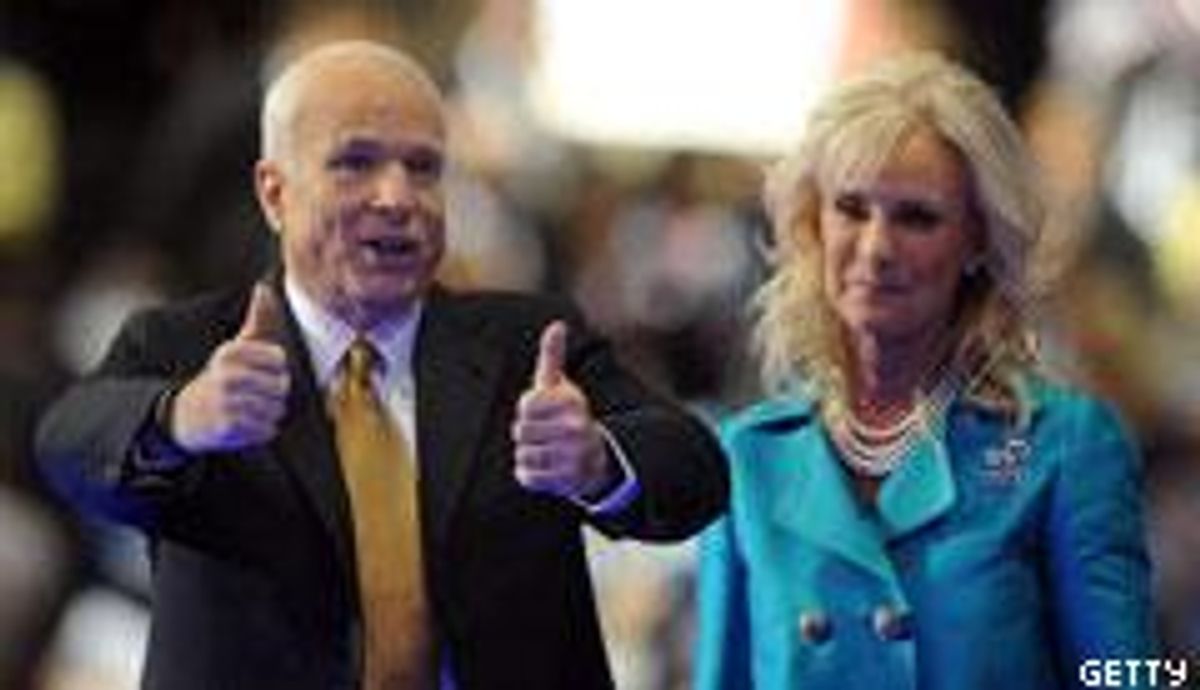For anyone still
wondering, on the left or the right, where John McCain
now stands on two of the most divisive social issues of our
time -- abortion and gay rights -- the Arizona
senator made his beliefs clear as he accepted the
Republican Party's nomination for president Thursday
night in St. Paul, Minnesota. Before a hall of enthralled
Republicans at the Xcel Energy Center here, he
declared his support for a "culture of life"
-- and judges "who dispense justice impartially and
don't legislate from the bench." The latter reference,
though coded in language about an "activist"
judiciary, was an obvious swipe at same-sex marriage,
in a year when the California Supreme Court ruled in favor
of marriage equality (and when that state and two
others, including McCain's home state, face
ballot initiatives over the issue).
Pundits had
speculated whether the Republican nominee would directly
address the conservative base in his speech capping his
party's 2008 convention, even though his running mate,
Alaska governor Sarah Palin, had sufficiently
energized evangelicals (and gun owners) in the heady
days before. But his campaign clearly wagered that McCain
needed to bolster his critics once more, and that he
did, albeit it in a veiled way -- the better to not
dissuade the swing voters who will determine this
election two months from now.
The references
came in a town-hall-style talk that was heavy on the
former POW's biography, exploited all week long by
convention speakers in an effort to prove that McCain,
and not Democratic nominee Barack Obama, had the
experience and resolve to lead America at a time of numerous
geopolitical threats. And while McCain also emphasized his
"maverick" reputation in taking on his own party during his
career in Congress -- and his commitment to bipartisanship
in getting things done there -- his jabs at
supporters of abortion rights and gay rights showed
that the man who once defiantly denounced religious
"agents of intolerance" is no longer the independent thinker
on the issues that social conservatives feel most
strongly about.
Gays and lesbians
watching the speech may have noted one other statement
that could be interpreted as divisive: that education is
"the civil-rights issue of this century." While McCain
was specifically referring to the differing levels of
"access" that white students and their black and
Latino peers have to quality schools, members of
the LGBT community would be forgiven for thinking that their
struggle for equal rights was of paramount concern.
McCain's speech,
complete with several diversions by protesters --
including a man two tiers above a media work section bearing
a sign that said YOU CAN'T WIN AN OCCUPATION -- was an
anomaly in a week that featured little outright
criticism of gay marriage from convention speakers, in
marked contrast to the Republicans' 2004 convention, when
the Federal Marriage Amendment was frequently (and
strategically) cited. Indeed, except for a remark by
McCain's former rival Mike Huckabee about not changing
"the very definition of marriage from what it has always
meant throughout recorded human history," there was an utter
lack of explicit rhetoric on gay issues -- contrary to
the strong statements of support heard at the
Democratic convention in Denver last week.
Sure, high-level
McCain campaign staffers like national political
director Mike DuHaime and senior strategist Steve Schmidt
addressed the Log Cabin Republicans this week, but it
was hard to square their outreach with the GOP's
overall silence when it comes to LGBT people. McCain is
known for gambles, but only Election Day will tell whether
his and his party's strict avoidance of the same
voters Obama's campaign is assiduously courting will
pay off.













































































